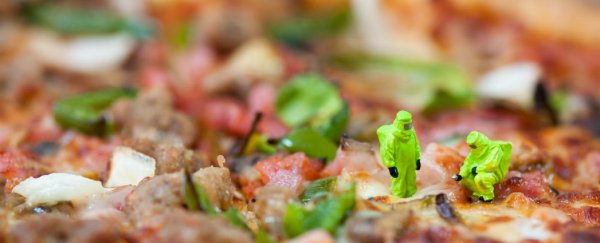Marijuana and the munchies are so inextricably linked, it's impossible to imagine one existing without the other. Imagine weed without Oreos and having MacDonald's french fries dipped in salted caramel ice cream - long after you knew you were full - without weed. But why is this unholy coupling so stubbornly linked? Researchers at Yale wanted to figure it out.
"Everyone knows that if you smoke dope after Thanksgiving dinner you will still go back and eat more - sometimes much more," lead researcher and professor of neurobiology, Tamas Horvath, told Deborah Netburn at The Sydney Morning Herald. "We were interested to find out why."
The team monitored the brain activity that kicks into gear after a hit of weed, and promotes an intense feeling of hunger regardless of how hungry you actually are. Studying the brain activity of mice, they found that when marijuana is consumed, a receptor in the brain known as the cannabinoid receptor type 1 (CB1) activates a neuron called Pro-opiomelanocortin (POMC), which releases chemicals that are usually associated with making us feel full.
It releases the α-Melanocyte-stimulating hormone (α-MSH), which is responsible for giving us our skin and hair pigmentation, but also for regulating our metabolism, sexual behaviour, and yep, our appetites. But in the case of the munchies, it works in exactly the opposite way. WTF, brain?
"By observing how the appetite centre of the brain responds to marijuana, we were able to see what drives the hunger brought about by cannabis and how that same mechanism that normally turns off feeding becomes a driver of eating," said Horvath. "It's like pressing a car's brakes and accelerating instead. We were surprised to find that the neurons we thought were responsible for shutting down eating were suddenly being activated and promoting hunger, even when you are full. It fools the brain's central feeding system."
The team figured it out by working with two different types of mice, one of which was bred to have its POMC neurons blocked from being released into the brain. When the CB1 receptors were fired in the brains of the mice with blocked POMC neurons, they weren't interested in their food. But the other mice, the ones with free-flowing POMCs, chowed the house down. Nick Stockton explains the results at Wired:
"The researchers found that the POMC cells activated by CB1 had high levels of free radicals, which are created by cellular engines called mitochondria as they convert oxygen and food into energy. These extra free radicals indicate that the mitochondria in stoned POMC cells are working overtime. The researchers believe that this points to a certain mitochondrial protein that is telling the POMC cell to create munchie-inducing enzymes - they're called beta-endorphins, in case you forgot - in addition to the a-MSH party killers."
And the study, which was published in Nature today, isn't just one of those, "Hey, we understand a little more about the human species now. Good job, scientists," studies. Horvath and his team will be continuing their work on this peculiar brain mechanism to see if they can help cancer patients regain their appetite as they undergo treatment, and also get it to work in the other way, and help people who are trying to lose weight.
Don't say weed never did anything for society.
Sources: Wired, The Sydney Morning Herald
